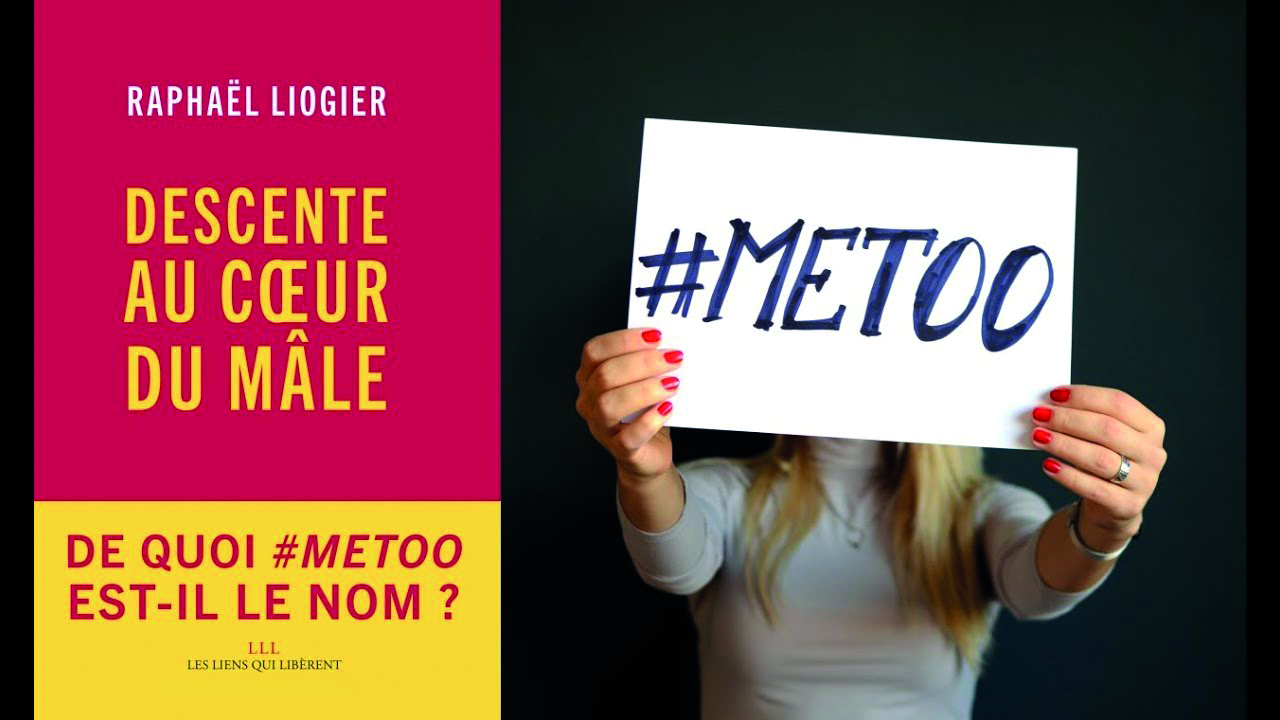Author of Descente au coeur du mâle (Descent to the male’s core), philosopher and sociologist Raphaël Liogier analyses the #MeToo movement and what it reveals of the male-female relationship in our society. Going beyond the regulated rhetoric on gender equality, his book challenges the reader. He eagerly presses where it gets discomforting by decrypting the mechanisms that underlie what he calls the male “culture of domination”.
INTERVIEW
Sustainability MAG: Your latest work investigates the #MeToo movement. You point it as a key marker of male-female relationships in our society. What does this overwhelming questioning express according to you?
Raphaël Liogier: Yes at the very least it is a fundamental marker, but above all it is in my view the first time that a social movement of such magnitude puts the crux of the gender inequality debate. And not on its surface. In 68, the right questions were raised when the Women’s Liberation Movement was created, but it did not extend to millions of people like the #MeToo movement today. It really is a social movement of an unprecedented magnitude until now regarding what has to be considered the most profound inequality, the most irreducible in the history of humanity, which is not insignificant. I find it downplayed, which is why I decided to write this book. It is so profound. The issue in #MeToo is so rightly and radically raised - without any extremism contrary to public belief - that people try to talk about something else, to act as if they did not understand because to a certain extent it hurts too much.
This is where we tackle the real issue. The core problem, the one I am trying to point out as I’ve found that it was not addressed, is the status of a woman’s body in a man’s eyes today. How does he see her? How does he desire her? How is he picturing her? Men keep picturing women as a body they sexually enjoy and which thus cannot come by itself. We do not see clearly enough that it is based on this inequality that all the remaining inequalities are articulated in concentric circles, meaning the economic inequality, then the legal inequality which is the official inequality. Fortunately, in most advanced industrial societies but not all, the law now acknowledges the women’s right to equality, but not economically and even less on this focal point which is at the core of the issue. It is essential.
#MeToo and the Weinstein case, it is thus precisely the culture of domination which is affected?
Women are not denouncing men as such, contrary to what is said, but they question, situations of domination. In the Weinstein case, it is not sex that is questioned, but the domination. He gets women up to his room to let them know why they are there, he asks them to undress, to massage him. He is leveraging his power. He wants them to know that even if they do not want him – and he precisely denies their desire – they accept to overcome it, and thus to submit themselves. He delights in this domination. It is his power he enjoys, not the women’s bodies directly. It is the Don Juanism in the strictest sense, in the sense of the ultimate denial of the women’s will.
The Weinstein case shakes Hollywood. Solidarity in Black at the 2018 Golden Globes ceremony.
You say women have become a domesticity. You even mention the concept of sexual capitalism…
Yes, they have become a domesticity and the most precise word (and it is terrible when stated) is that women have become a fungible commodity. In economy, it is a commodity, which is constantly negotiated on the market, can be source of prestige, but above all, can be owned and decreases in value with use, when it is too much exchanged or used. It is very exactly how men picture women as they draw their pleasure from the fullest possession of women. They have even progressively interpreted their sexuality as being almost exclusively possession fantasies, which make them win something whereas the woman (they “take”, they “possess” as depicts the vocabulary used) she, loses something (“she loses her virginity”, “will be his”…). We see it in the Bible, we see it in all the texts. It is the most internalised thing in the world. From schoolyards to night clubs, the very predation system works.
When a woman realises that she can enjoy the initial pleasure which is the pleasure of her body, she realises by extension that she can enjoy all goods, property for instance. As the body is the first of all sovereignties, it is the foundation of all enjoyment, whether civil, economic or political. When a woman is given the right to vote, the right to property (what took a long time to do), and one does not acknowledge the core of the issue, which is the body as source of autonomous enjoyment, all the rest remains a hollow exercise.
"Women have become a fungible commodity which can be source of prestige, but above all can be owned"
It is thus the expression of her own will which is limited, if not denied? There is an unequal social game where women are denied the very principle of their will, of their subjectivity, as you describe in your publication…
In human history, we have always tried to restrain women’s enjoyment at different levels. By denying it first, there the physical excision certainly is characteristic, but there is the moral excision as well. And there, it is universal. It is what we call the typically female modesty, the slightly pale and sickly charm, it is the high heels which weaken her gait. Everything that exists in a negative way making it a kind of withdrawal. Everything which expresses a form of passivity is associated to women. Therefore, if a woman starts talking, she talks too much - she becomes chatty-, or she talks rubbish - she is incompetent. These are primitive reflexes that are linked to the way we picture a woman’s ability to enjoy her body and the world in general.
The second step is the 19th century where women’s pleasure is considered pathological and thus has to be controlled. It is from there that arises the expression: “a woman is hysterical” which stems from the term uterus. As if men had projected on women the idea that they could die from pleasure because their sexuality can be perceived as endless, contrary to men. And it is clear that it is the fear of impotence that is at the root of it. Women should be treated from themselves, they should be stopped from giving in to their pathological patterns, unlike men who are naturally limited in their pleasure and who need not to be stopped.
In the 70s, the third stage, a freedom is acknowledged but incidentally the autonomy of women’s pleasure is denied by saying that it is caused by men. Thanks to men. The autonomy is not acknowledged, yet this is what the transcendental subjectivity is.
And you also noticed this in the corporate world. How is it reflected there ?
Concretely, in the workplace for instance, a woman may be a company’s CEO, as long as a man will look at her body as potential passive object of pleasure, with all those minor comments and little smiles, there will always be something missing in this woman’s appreciation as active subject as CEO. We have to start from the intimacy to understand what happens then in the social, in the political sphere.
We are at the heart of a social transformation. When we talk about biases, depreciations, insults to women, when we talk about bottom pinching, little taunts and smiles that say it all, all this derives from what happens with the woman’s body. The concept of hysteria is also very present. A woman is supposedly unable to keep cool, to deal with serious topics. She would be less solid, confined to her maternity, “she will fall for her feelings”, “she cannot be trusted”, “she doesn’t have the strength” we repeatedly hear…all the biases we find in the professional world are extensions of the relationship men cultivate with women’s bodies. As long as we do not tackle this issue, it is impossible to consider a true equality, that is reciprocity.
"There is an uncertainty zone. It can only be overcome if there is an authentic indecent debate"
You call for a preconceived identity no longer to be assigned to women. But we are here facing anthropological structures that are based on thousands of years.
Admittedly, we cannot suddenly wipe out projections and fantasies that have lasted thousands of years. It is structural. What does it mean? It means that it asks for a long process of transvaluation. Nietzsche’s term seems here the most accurate. That is to say, we keep the same signs but we change their meaning.
Take for example the paradigm of the high-heel, which is a sign of femininity associated to a fragility of gait. Today, there are women CEOs who wear high-heels, but these take on a new meaning: they will at once mean a form of classical sexiness as well as a form of authority, of severity and strength as a woman. The opposite of a withdrawal posture eventually. It is the same sign, but its meaning changes. It is the same with beards for men. Today, the beard has expanded in nearly all spheres, but it doesn’t correspond to the absolute bushy “woodcutter” beard anymore, which expresses a slightly rough masculinity. If the beard remains clearly a masculinity sign for men, a form of coquetry is added to it. The beard is trimmed in detail to give a style, treated with care by barbers. In short, a manner that would have been qualified as a “feminine” manner of taking care of oneself. In this example, the coquetry, something a priori feminine, applies to the beard, by definition something totally masculine. There is an overturn, this is what transvaluation is.
It is the multiplicity of meanings that matters. It is a liberation of the pre-established roles. We let the new roles build themselves, the old esthetic signs can last but without being linked to a domination.
What continuation do you see? Are you optimistic? Do you think that we can fundamentally change things and really touch this “male’s core” as you name it?
I believe we already touched it. Once the real issue is raised, we cannot go back but how many abuses, how many internal wars, is it going to take for it to be genuinely widely accepted? We have tackled the patriarchal civilisation but how much time is it going to take? The risk is a backlash. It can be so frightening, it is a major transformation than can be difficult for everyone.
Here, organisations like IMS are critical because they are accelerators of history to enable a peaceful transition. The message should be admittedly men lose their privileges, but they also free themselves from a preconceived role play in which they were trapped as a result of their domination. Setting themselves free of it is difficult as it is deeply rooted, but very liberating, because we realize that it is not worth it.
It is especially up to women to educate men because they are a step ahead, because they had to fight and have the strength of those who have fought whereas men are less prepared. It is up to women to explain and reassure; in that sense, a reorientation of the meaning of feminist rhetoric is needed, because many men are frightened by a feminist extremism, they do not know how to behave anymore.
"All the biases we find in the professional world are extensions of the relationship men cultivate with women’s bodies. As long as we do not tackle this issue, it is impossible to consider a true equality"
Precisely, there is a preconceived identity of men and a broadly normed masculinity order in our societies…
There is thus an ill-being that can originate from this order. A tremendous ill-being yes. Nowadays, there is both what has been conveyed, the embedded norm as Bourdieu says, and at the same time the fact that society has officially changed. Those norms thus officially do not have any value anymore, they are not legitimate anymore. Men find themselves confronted with a difficulty, in a situation where they do not know how to behave anymore.
Between the embedded norms and the official norms, there is an uncertainty zone. It can only be overcome if there is a debate, but an authentic indecent debate. Not a debate that sticks to the surface of things.
Isn’t #MeToo a topic that has already been quite forgotten or too quickly buried? As if we had tried to ignore the movement’s magnitude? Do you feel that the topic is minimised?
Of course the topic is minimised but in a sense, it's for the better because it's when the topic is subject to scandals in the media that it is massively misinterpreted and that the risks of backlash are important.
There is a groundswell and what is undermining it is media coverage. Because the media coverage we have seen is just nothing. We haven not heard anything; what is written on the #MeToo Twitter feed is all wrong.
The movement currently walks its little way. Men and women progressively realise the situation. This is only the beginning. A kind of internal bang was produced and it is more significant by its silence than by the outrageous exclamations.
#MeToo, a viral explosion to rethink the relationship between men and women
The revelations of the Weinstein Affair, involving the famous American film producer accused of raping and sexually assaulting 93 women, have created an unprecedented wave of propagation starting in 2017. With more than 17 million tweets, the hashtag frees the victims' voices and launches a real social movement throughout the world. The #YoTambién, #keineKleinigkeit and #stilleforopptak are available for stars and anonymous people to testify that they have been victims of sexual harassment or assault, particularly in the workplace. Until recently, Indian Minister Mobahar Jawed Akbar declared he was resigning from his post, accused by about 20 women.
#MeToo, a viral explosion to rethink the relationship between men and women
The revelations of the Weinstein Affair, involving the famous American film producer accused of raping and sexually assaulting 93 women, have created an unprecedented wave of propagation starting in 2017. With more than 17 million tweets, the hashtag frees the victims' voices and launches a real social movement throughout the world. The #YoTambién, #keineKleinigkeit and #stilleforopptak are available for stars and anonymous people to testify that they have been victims of sexual harassment or assault, particularly in the workplace. Until recently, Indian Minister Mobahar Jawed Akbar declared he was resigning from his post, accused by about 20 women.
Sociologist and philosopher, Raphaël Liogier explores the crises and mutations of human identity. He decrypts contemporary beliefs and myths, individual and collective imaginary constructions and their political, social and economic consequences. He was director of the Observatoire du religieux (Religious Observatory) from 2006 to 2014. With a degree in Philosophy from the University of Edinburgh, he teaches at the Institute of Political Studies of Aix-en-Provence and at the International College of Philosophy. He also is an associate researcher at the Columbia University and the University of Paris 10 Nanterre.
To be read also in the dossier "True to Women?":





